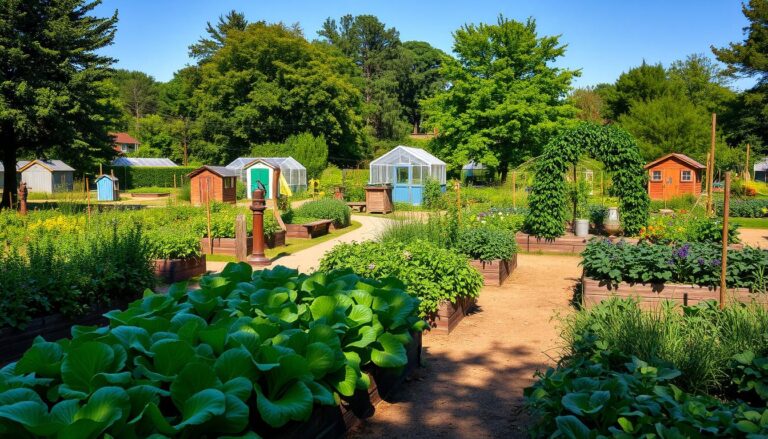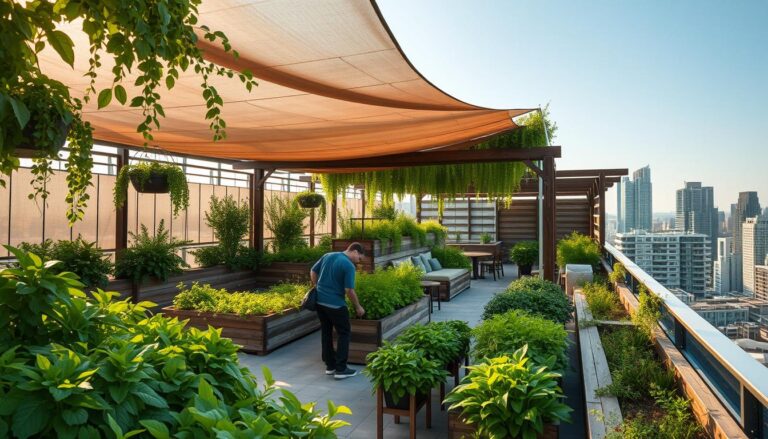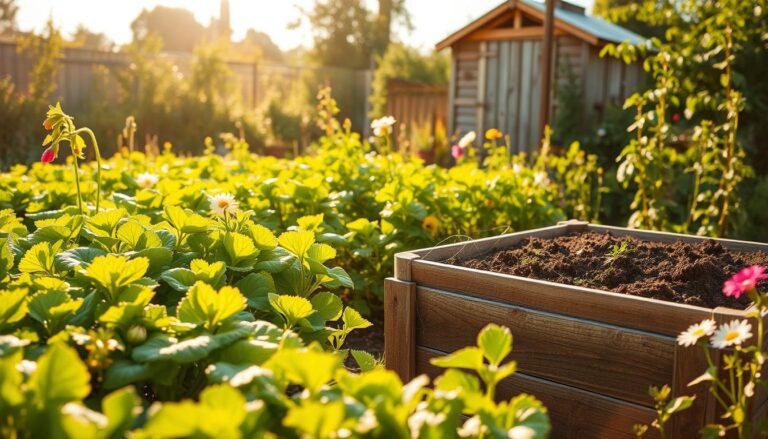Welcome to the world of eco-friendly gardening practices. Here, growing a garden is not just fun. It’s also a way to live more sustainably.
By using organic gardening resources, you make your garden healthier. You also help keep our environment clean.
In this article, we’ll talk about the good things about these practices. We’ll share tips on how to grow a garden that’s full of life. And it won’t harm the planet.
Learn how small changes in your gardening habits can make a big difference. Get ready to enjoy a garden that’s not only lovely but also good for the Earth.
The Foundations of Organic Gardening
Every successful organic garden starts with a deep understanding of natural gardening and sustainable tips. Organic gardening focuses on the health of the soil, plants, and the whole ecosystem.
Understanding Organic Principles
Organic gardening is all about gardening without chemicals and working with nature.
Defining Chemical-Free Gardening
Chemical-free gardening means no synthetic fertilizers or pesticides. Instead, we use natural methods to keep the soil healthy and diverse. This way, our food is healthier, and the environment is safer.
Working with Nature’s Systems
Working with nature means copying its ways. We do this by rotating crops, composting, and using native plants. These actions help create a balanced garden ecosystem.
Benefits for Your Health and Environment
Organic gardening brings many benefits. We get healthier food, better soil, and a smaller environmental footprint. By choosing organic, we help make the future greener.
| Benefits | Description |
|---|---|
| Healthier Produce | Free from synthetic chemicals and rich in nutrients. |
| Improved Soil Health | Enhanced fertility and biodiversity through natural amendments. |
| Environmental Sustainability | Reduced pollution and conservation of natural resources. |
Setting Realistic Expectations
Gardening is a journey, and it’s important to set realistic goals. Remember, organic gardening takes time, patience, and learning. With these, you’ll see success in the long run.
Essential Organic Gardening Resources for Success
Starting a thriving organic garden needs the right tools and knowledge. There’s a lot of information out there. Gardeners can get better and solve problems with it.
Must-Have Books and Publications
Books and publications are key for deepening your organic gardening skills. They offer detailed guides, practical tips, and the latest green gardening news.
Top 5 Organic Gardening Books
- “The Organic Gardener’s Handbook” by Jane Smith
- “Gardening: A Guide to Growing” by John Doe
- “The New Organic Grower” by Bob Brown
- “Four-Season Harvest” by Alice Johnson
- “The Vegetable Gardener’s Bible” by Edward C. Smith
Reliable Magazines and Journals
Magazines and journals focused on organic gardening share the latest in gardening. They cover best practices, new methods, and product reviews. Check out Organic Gardening Magazine and Green Culture.
Digital Resources and Apps
Today, many apps and online platforms help organic gardeners. They offer gardening planners, plant ID tools, and forums to connect with others.
Local Extension Services and Community Groups
Joining local gardening groups and using extension services is very helpful. They offer personalized advice, workshops, and local expertise. These resources are great for improving your gardening and meeting others who share your interests.
Building Healthy Soil: The Foundation of Your Garden
Healthy soil is key to a thriving organic garden. It gives plants the nutrients they need to grow well. A good soil ecosystem helps plants stay healthy and improves the soil’s structure.
Composting Fundamentals
Composting is vital for healthy soil. It turns organic materials into a rich soil amendment. Composting reduces waste and makes a natural fertilizer for plants.
Creating Your First Compost Pile
To begin composting, mix “green” materials (like kitchen scraps) with “brown” materials (like dried leaves). Put these layers in a compost bin. Make sure it’s moist and has air.
Troubleshooting Common Compost Problems
Issues like bad smells, pests, and slow breakdown can happen. Regularly turn the compost and check moisture to solve these problems.
Natural Soil Amendments
Compost isn’t the only way to improve soil. Manure, peat moss, and green sand are also great. Each has its own benefits for soil.
| Amendment | Benefits | Usage |
|---|---|---|
| Manure | Rich in nutrients, improves soil structure | Mix into soil before planting |
| Peat Moss | Retains moisture, improves soil acidity | Add to potting mixes or garden beds |
| Green Sand | Slow-release potassium, improves soil fertility | Mix into soil or use as a top dressing |
Testing and Improving Your Soil Structure
Soil testing is crucial to know your soil’s nutrient levels and pH. Use test results to adjust your compost and amendments for better soil health.
Selecting and Growing Organic Plants
Choosing the right plants for your garden is key in organic gardening. The right plants will grow well and need less care. They use fewer resources and are easier to maintain.
Choosing the Right Plants for Your Climate
It’s important to know your local climate and soil. Look for plants that grow well in your area. This makes your garden strong against pests and diseases.
Seed Saving and Heirloom Varieties
Seed saving is a great way to keep your favorite plants alive. Heirloom varieties are special because of their unique traits and tastes.
Starting a Seed Bank
To start a seed bank, pick seeds from your best plants. Keep them in a cool, dry spot and label them. This saves money and keeps plant diversity alive.
Sources for Organic Seeds
There are many places to find organic seeds. Look for local nurseries, online stores, and seed exchanges. Choose places that sell heirloom and organic varieties.
| Seed Source | Description | Benefits |
|---|---|---|
| Local Nurseries | Nurseries that specialize in organic and heirloom plants | Expert advice, locally adapted plants |
| Online Seed Retailers | Websites that sell a wide variety of organic seeds | Convenience, wide selection |
| Seed Exchanges | Events or online platforms where gardeners exchange seeds | Community engagement, rare varieties |
Companion Planting for Garden Health
Companion planting means growing different plants together. Some plants keep pests away or attract good bugs. Others provide shade or help the soil.
Natural Pest Management Without Chemicals
Keeping an organic garden free from pests without chemicals is a big challenge. It’s key to keep your garden healthy and productive. By using sustainable gardening tips and eco-friendly practices, you can protect your plants and the environment.
Identifying Common Garden Pests
First, you need to know what pests are in your garden. Common ones are aphids, slugs, snails, and caterpillars. Each pest needs a different solution. Watch your garden closely to spot problems early.
Beneficial Insects and How to Attract Them
Not all insects harm your garden. Many are good and help control pests. Ladybugs, lacewings, and parasitic wasps are examples. To attract them, plant a variety of flowers and herbs for food and shelter.
DIY Organic Pest Solutions
Making your own organic pest control is cheaper and safer. Here are two ways:
- Herbal sprays and deterrents
- Physical barriers and traps
Herbal Sprays and Deterrents
Some herbs and plants make sprays that keep pests away. Garlic and hot pepper sprays can keep aphids off. To make garlic spray, blend garlic with water, strain it, and spray it on your plants.
Physical Barriers and Traps
Use fine mesh or netting to keep pests like whiteflies away. Traps, like sticky traps and pitfall traps, also work well. Combining these methods cuts down on chemical use.
With these eco-friendly gardening tips, you can have a healthy garden that’s good for the environment. The goal is to manage pests so your garden can flourish.
Essential Tools and Equipment for Organic Gardening Resources
Organic gardening is more than just knowing what to do. It also needs the right tools and equipment. Having the right tools makes gardening easier and more fun.
Hand Tools for Natural Gardening
Hand tools are crucial for any garden, especially for organic gardening. You’ll need hand trowels, cultivators, and pruning shears for planting, weeding, and caring for plants. Choosing durable tools can greatly improve your gardening experience.
Irrigation Systems for Water Conservation
Water conservation is key in organic gardening. Drip irrigation and soaker hoses are great for this. They save water by giving it directly to the roots, reducing evaporation and runoff. This also helps prevent fungal diseases that love moist places.
Sustainable Materials for Garden Structures
Choosing sustainable materials for garden structures is important. It’s good for the environment and makes your garden look and feel natural.
Raised Beds and Containers
Raised beds and containers help with soil drainage and warm the soil faster in spring. You can use reclaimed wood, bamboo, or composite materials to make them. They also keep your garden tidy and easy to get around.
Trellises and Supports
Trellises and supports are essential for plants that need to grow upright or spread out. You can use bamboo, wood, or metal for these. They save space and make your garden look better.
Using these tools and equipment in your organic gardening will make it more efficient, productive, and enjoyable.
Conclusion: Nurturing Your Organic Garden Journey
Starting your organic garden journey takes patience and a willingness to learn. This article is just the beginning. Keep exploring and using different organic gardening guides to grow your knowledge and skills.
Joining local community groups and using green gardening resources can really help. These connections offer advice, support, and motivation.
Organic gardening is a big commitment, but it’s worth it. It makes your garden healthier and supports sustainable gardening. You’ll also enjoy the many benefits it brings.
Keep working towards your organic gardening goals. Always look for new green gardening resources. With dedication and the right help, your garden will flourish, becoming a beautiful space for you and the local wildlife.
FAQ
What are the benefits of using organic gardening resources?
How do I start composting for my organic garden?
What are some effective natural pest management methods?
How can I improve the soil structure in my organic garden?
What are some eco-friendly gardening practices I can adopt?
Where can I find reliable organic gardening resources and guides?
What are some essential tools for organic gardening?
How can I choose the right plants for my climate and region?

Sortemdia nasceu com o propósito de trazer alegria e oportunidades para todos por meio de sorteios gratuitos de prêmios incríveis. O site tem como missão oferecer experiências acessíveis, divertidas e justas para quem deseja concorrer a produtos, serviços e brindes sem pagar nada por isso. Acreditamos que a sorte pode bater à porta de qualquer pessoa — e no Sortemdia, ela pode chegar com apenas um clique.



